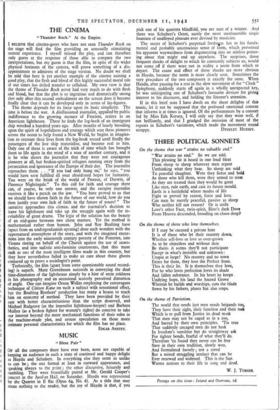MUSIC " Blest Pair" OF all the composers there have
ever been, none are capable of keeping an audience in such a state of continual and happy delight as Haydn and Schubert. In everything else they seem as unlike as can be ; the one formal at least in outward appearance, and speaking always to the point ; the other discursive, leisurely and rambling. They were beautifully paired at Mr. Gerald Cooper's concert in the Aeolian Hail, on Saturday. Haydn was represented by the Quartet in E flat (Opus 64, No. 6). As a title that may mean nothing to the reader, but the joy of Haydn is that, if you
pick one of his quartets blindfold, you are sure of a winner. And there was Schubert's Octet, surely the most inexhaustible single fountain of unalloyed pleasure ever devised by musician.
The secret of Schubert's perpetual freshnGss lies in his funda- mental and probably unconscious sense of form, which prevented his apparent waywardness from degenerating into an aimless potter- ing about that might end up anywhere. The surprises, those frequent shocks of delight to which he constantly subjects us, would not come off if there were not in reality a norm from which to depart. The cause and effect of these shocks are more obvious in Haydn, because the norm is more clearly seen. Sometimes the very procedure of the two composers is exactly the same. When Haydn, after pausing for a rest in the slow movement of the " Clock " Symphony, suddenly starts off again in a wholly unexpected key, he was anticipating one of Schubert's favourite devices for giving interest to his discourse, and holding the listener's attention.
If in this brief note I have dwelt on the sheer delights of this music, let it not be supposed that the profound emotional content that informs it at times is ignored. Of the performances by a consort led by Miss Eda Kersey, I will only say that they went well, if not brilliantly, and that I grudged the omission of most of the repeats in Schubert's variations, which made the movement sound


























 Previous page
Previous page